-
News & Trends -
Sales -
Marketing Related Topics -
B2B Software Guides Related Topics -
Free Tools & Resources -
- About Us About Us
HubSpot CRM is a leading platform that puts sales and marketing on the same system, with shared contact records, lifecycle stages, and activity history. Sales teams get real-time pipeline updates, task and activity tracking, and email and meeting tools, while marketing teams get inbound features like forms and chatbots to capture and qualify leads.
In this HubSpot CRM review, I explain where HubSpot excels in usability and support, and where it can fall short if you need advanced reporting or deep customization without upgrading. Read my review of HubSpot CRM to see if it fits your team.
HubSpot CRM is a leading free platform that unifies sales and marketing with shared records, activity tracking, and lead capture in an intuitive interface. Advanced reporting and customization typically require higher-tier plans.
| Best for | Teams that need sales and marketing aligned on one CRM with shared records, lifecycle stages, and reporting. |
| Standout features |
|
| Pricing plans (Customer Platform) |
|
| Free trial | N/A |
| Customer Support |
|
HubSpot continues to earn strong ratings on major review platforms, especially for usability, “all-in-one” functionality, and keeping sales and marketing on a shared customer record. The mobile apps score well overall, too, though a handful of recent Android reviews call out login and stability issues.
 | 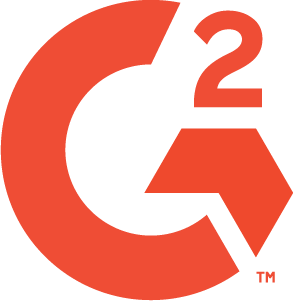 |  |  |
| 4.5 / 5 | 4.4 / 5 | 4.7 / 5 | 4.5 / 5 |
| 4,437 reviews | 13,509 reviews | 14,431 reviews | 12,679 reviews |
Users most often praise HubSpot CRM for its ease of use and clean interface, which makes daily work like contact management, deal tracking, and activity logging feel straightforward. They also like the all-in-one visibility that keeps sales and marketing aligned because contacts, deals, and engagement history live in one place. In addition, many highlight segmentation and organization tools, such as filters, lists, and dashboards that help marketing target the right audiences and sales prioritize follow-up.
HubSpot’s scale reinforces its reputation. The company reports serving over 288,000 customers in more than 135 countries, reflecting broad adoption across industries and company sizes.
The most common criticism is cost as teams scale, since pricing can rise quickly, and many advanced capabilities are locked behind higher tiers. Reviewers also call out reporting and customization limits, especially compared with more enterprise-focused CRMs built for complex processes. Finally, while the HubSpot mobile app is generally rated well, some Android users report reliability issues, such as login problems or being unable to access their accounts.
Score: 4.31 / 5
Yes, I would totally use HubSpot CRM, so I gave it a score of 4.31 out of 5. It’s the kind of platform I would have happily run my territory on when I was still a sales territory manager. Back then, my day was split between selling and busywork, and HubSpot has the exact features that reduce that drag: automated follow-ups and tasks, fast meeting booking, and a pipeline view that keeps deals from slipping through the cracks.
What pushes HubSpot CRM ahead for me is the context it gives reps. It has a unified contact record that can surface marketing signals like form submissions, email engagement, and site activity right next to deal notes, so I know who to call first and what to lead with. That said, advanced reporting and deeper customization tend to live in higher tiers, and pricing can climb as you add hubs and seats.
Score: 4.68 / 5
HubSpot CRM pricing scored 4.68 out of 5 in my expert evaluation. HubSpot offers a free CRM plus paid Customer Platform tiers that start at an affordable per-seat rate and scale to Professional and Enterprise packages for larger teams. Every tier includes the core CRM, and higher plans add stronger automation, reporting, and controls to improve sales and marketing alignment. You can start with the free tools before scaling up later.
| Customer Platform plans | Free | Starter | Professional | Enterprise |
| Best for | Individuals and very small teams | Small teams | Growing teams | Large organizations |
| Annual pricing per month | $0 for 2 users | $9/user | $1,300 for 6 users | $4,700 for 8 users |
| Monthly pricing per month | $0 for 2 users | $15/user | $1,450 for 6 users | N/A |
| Basic sales, marketing, service, content, and data tools | ✓ | ✓ | ✓ | ✓ |
| Calling | X | ✓ | ✓ | ✓ |
| Sales automation | X | ✓ | ✓ | ✓ |
| Breeze AI customer agent | X | X | ✓ | ✓ |
| Lead scoring | X | X | ✓ | ✓ |
| Advanced personalization | X | X | ✓ | ✓ |
| Customer and deal journey analytics | X | X | X | ✓ |
Score: 4.5 / 5
In this review of HubSpot CRM, I scored general features 4.5 out of 5. HubSpot covers the CRM fundamentals well, then layers in automation, reporting, and communication tools that help sales and marketing stay aligned in one system. I also evaluated its data quality tools, integrations, and mobile app for day-to-day usability.
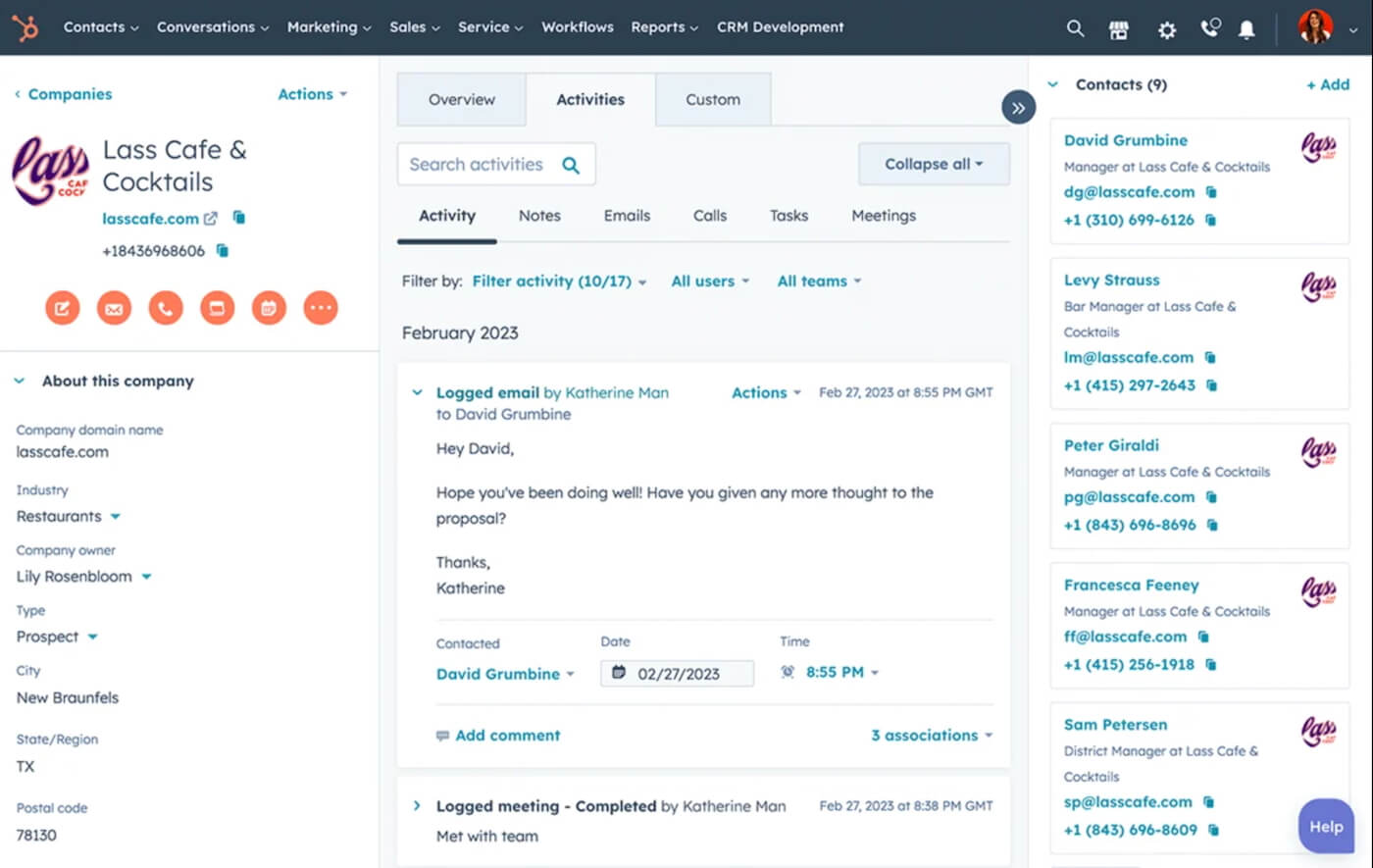
HubSpot provides a centralized CRM database for contacts, companies, deals, and tickets, all tied to a shared activity timeline. Users can import data in bulk, segment contacts using filters and lists, assign lifecycle stages, and track every interaction from emails to website visits. Lead capture tools, such as forms and chat, feed directly into the CRM, ensuring marketing and sales work from the same record without manual syncing.
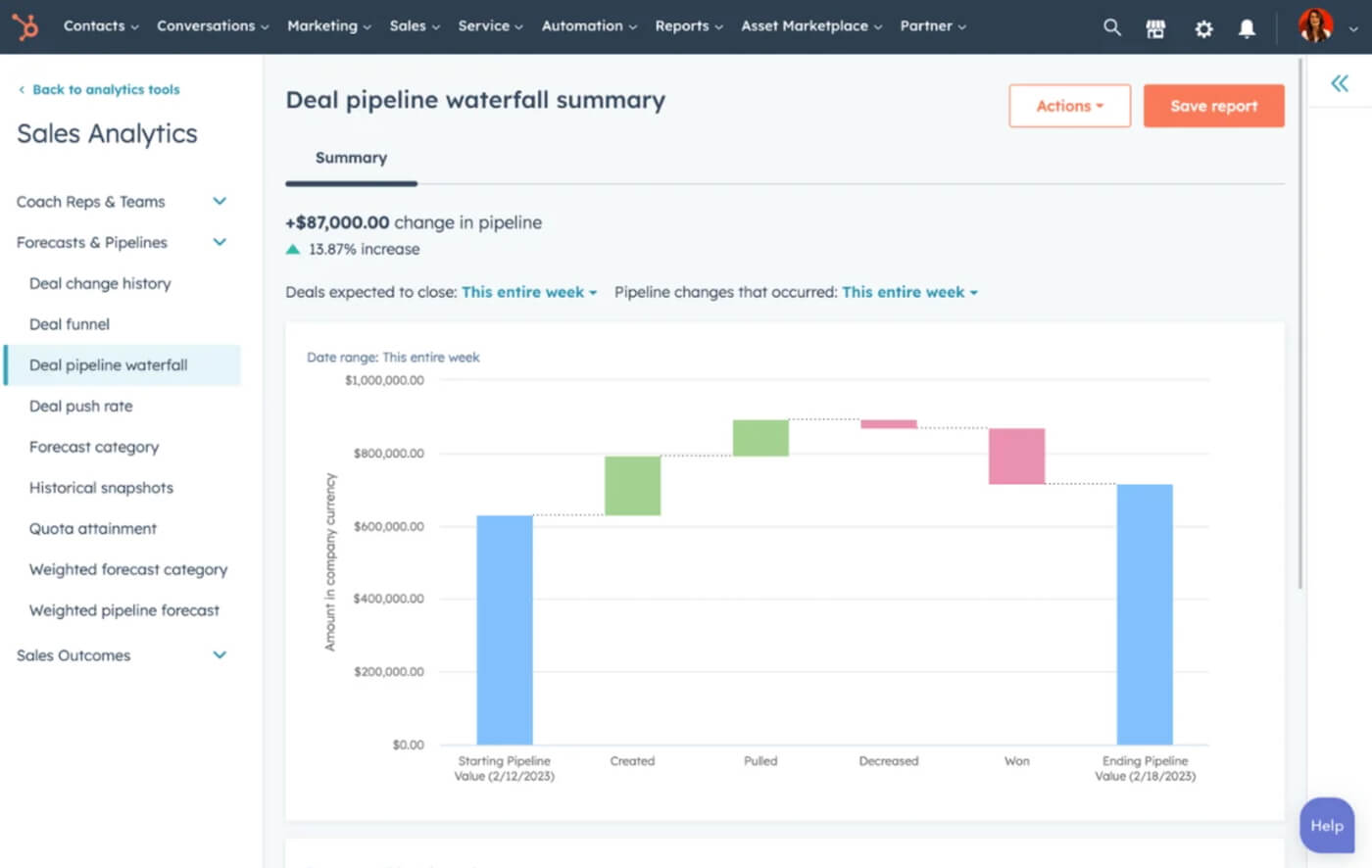
HubSpot includes customizable dashboards that track pipeline performance, conversion rates, activity metrics, and revenue outcomes. Users can build reports using prebuilt templates or create custom views depending on their subscription tier. While reporting is strong for most SMB and mid-market needs, more advanced attribution and complex custom reporting are gated to higher-tier plans.
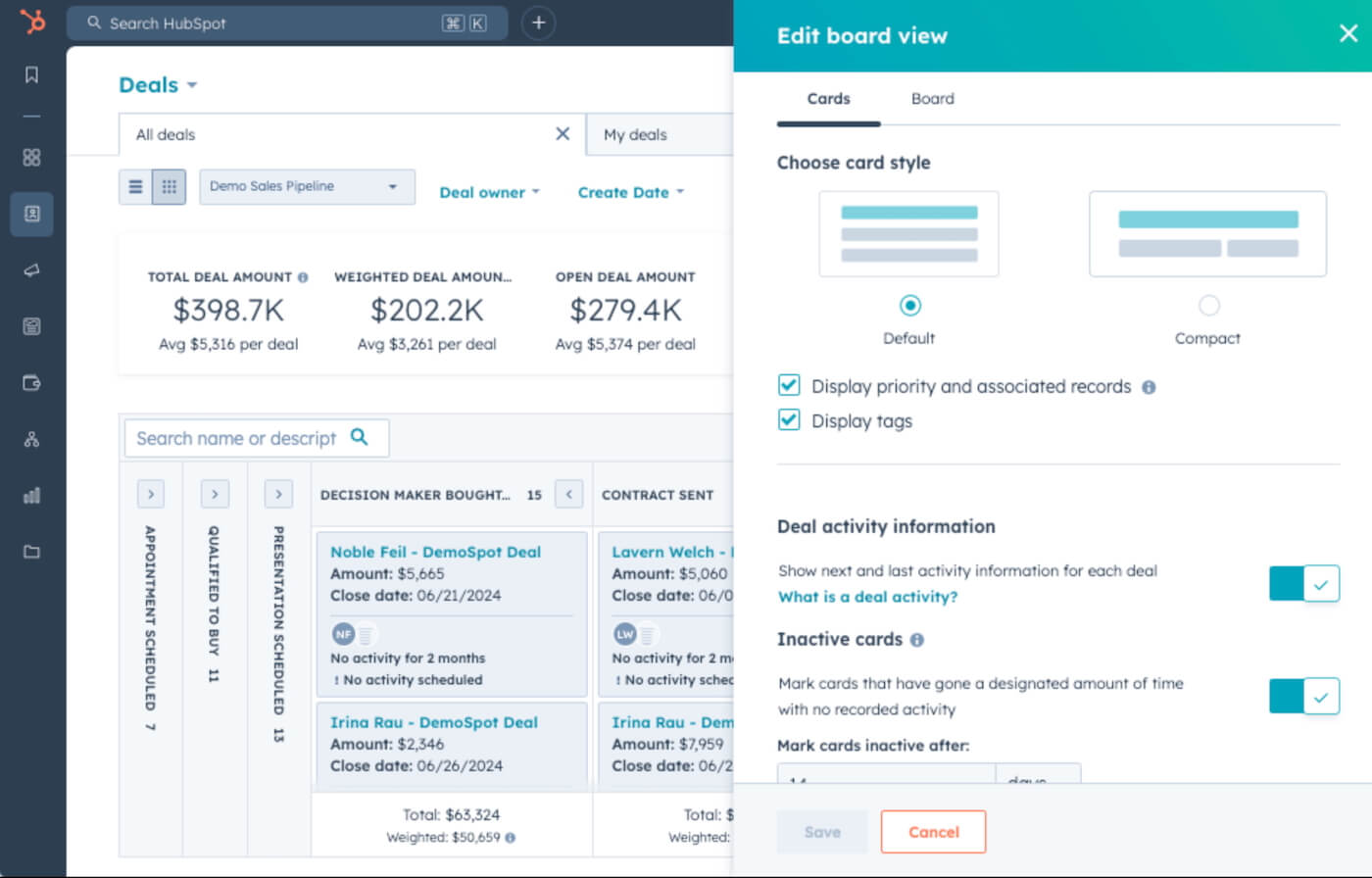
HubSpot allows teams to create multiple deal pipelines with custom stages that reflect their sales process. Users can define stage probabilities, automate stage movement, and tailor fields to match their workflow. This flexibility supports different business units or product lines, though deeper structural customization is more limited than enterprise-first CRMs.
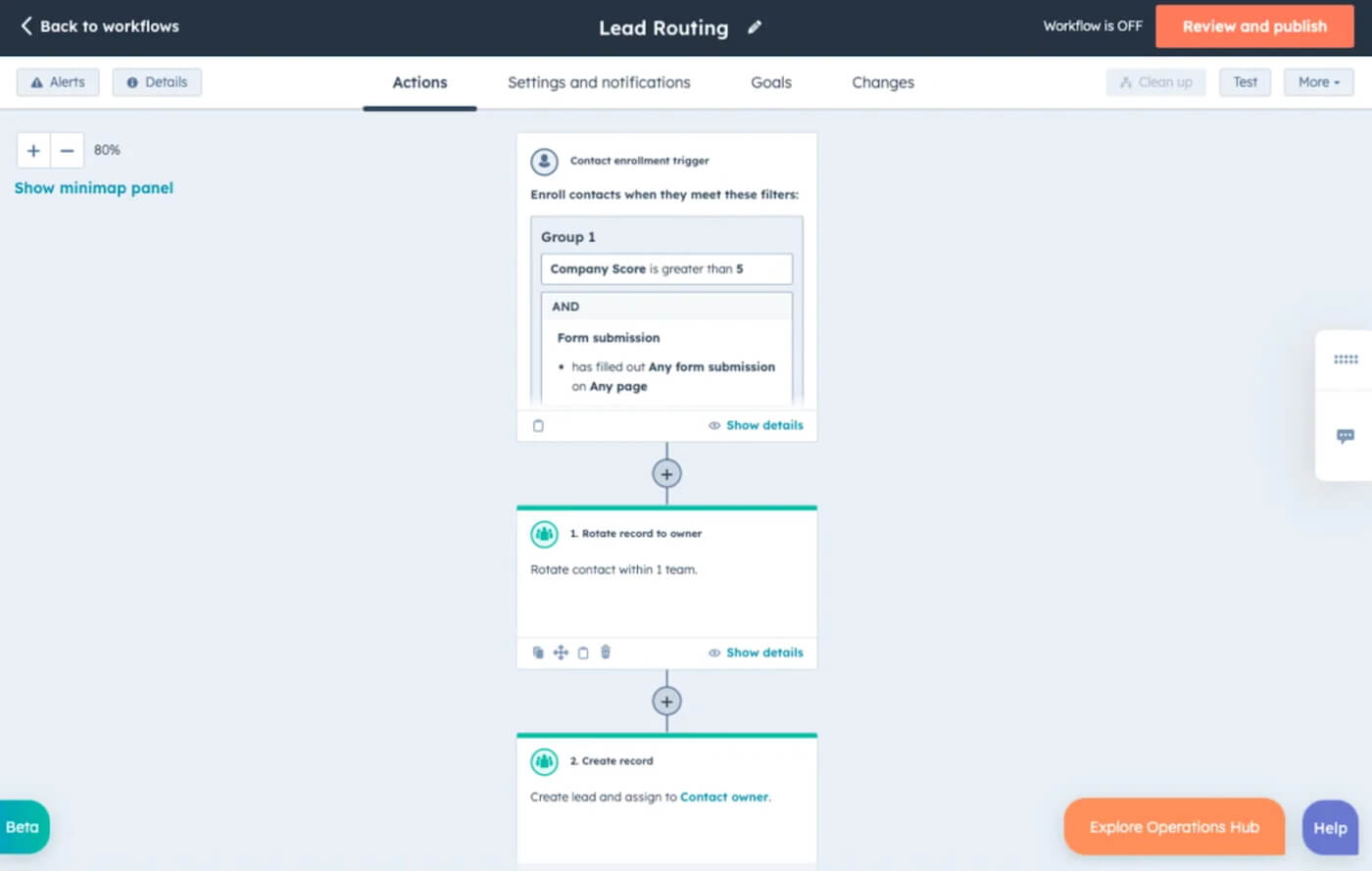
HubSpot offers workflow automation that can assign leads, update lifecycle stages, trigger notifications, and enroll contacts in sequences. Automation is available across sales and marketing hubs, helping standardize handoffs and reduce manual admin work. More advanced branching logic and scalable automation features are unlocked at Professional and Enterprise tiers.
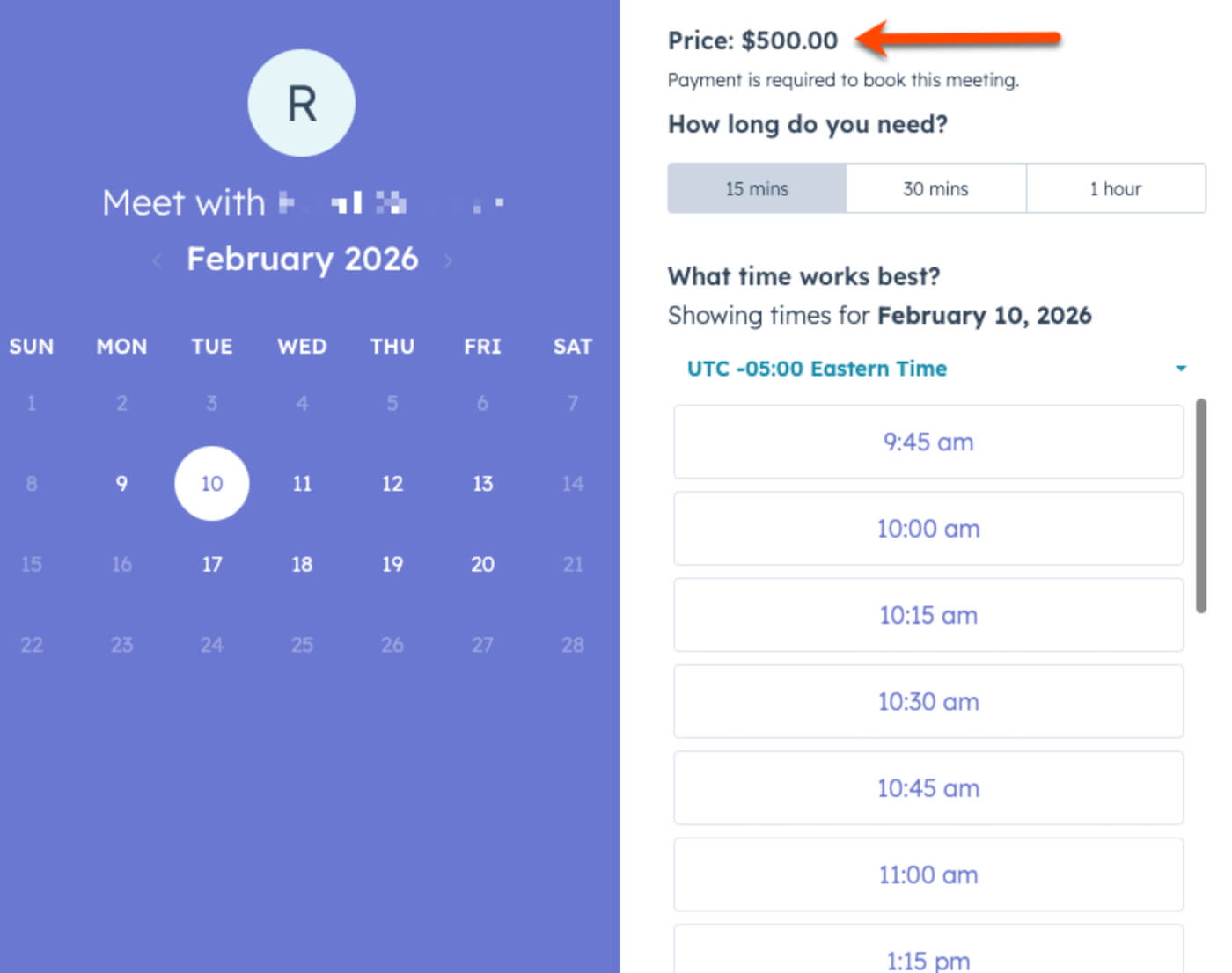
HubSpot includes built-in email tracking, meeting scheduling, call logging, and sales sequences to streamline outreach. Reps can enroll contacts into automated follow-up cadences and track engagement in real time. SMS functionality exists but is more limited and often tier- or region-dependent compared with specialized messaging platforms.
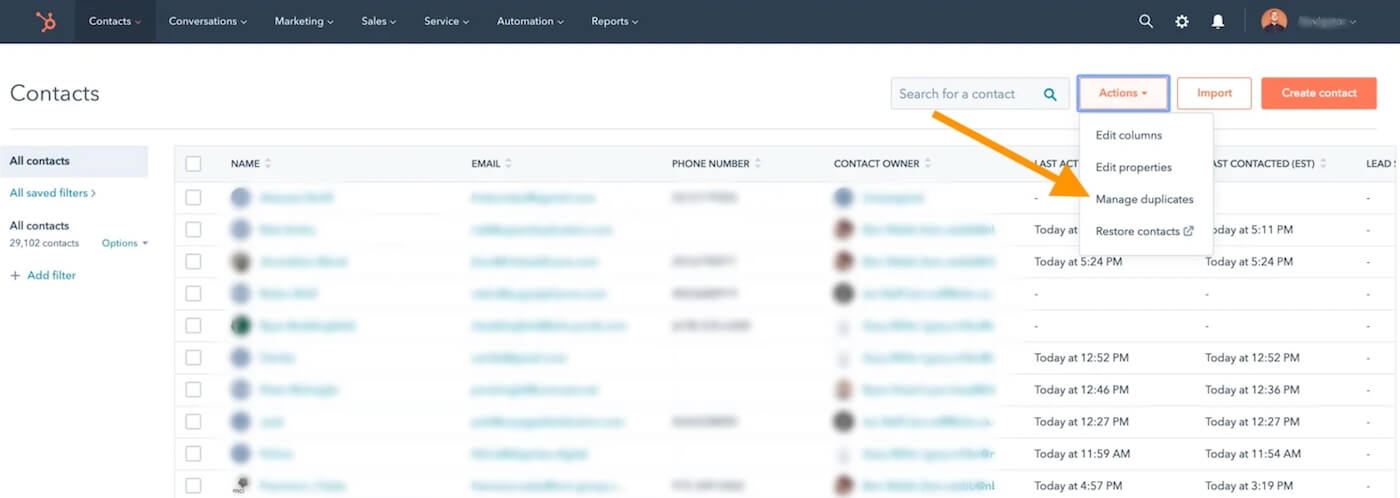
HubSpot provides duplicate management tools, property validation, and data cleanup features to maintain CRM accuracy. Admins can merge duplicate records and monitor data health from within the platform. Data enrichment capabilities are available but may require specific plans or add-ons.
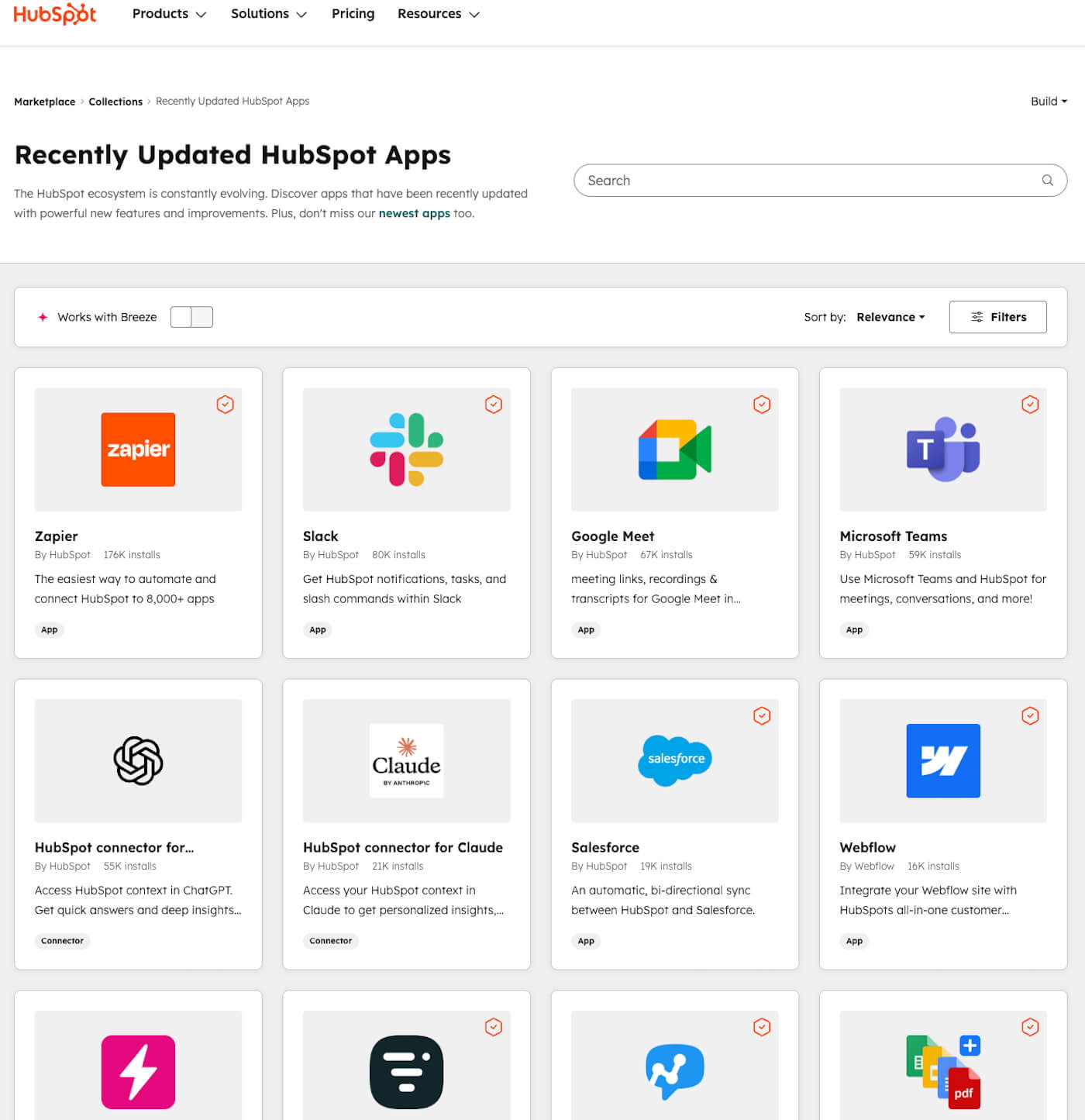
HubSpot offers a large app marketplace with hundreds of native integrations, along with API access for custom connections. Its Data Sync tools support bi-directional syncing with popular business applications. The integration ecosystem is broad and well-documented, making it easier to connect marketing, sales, and operations systems.
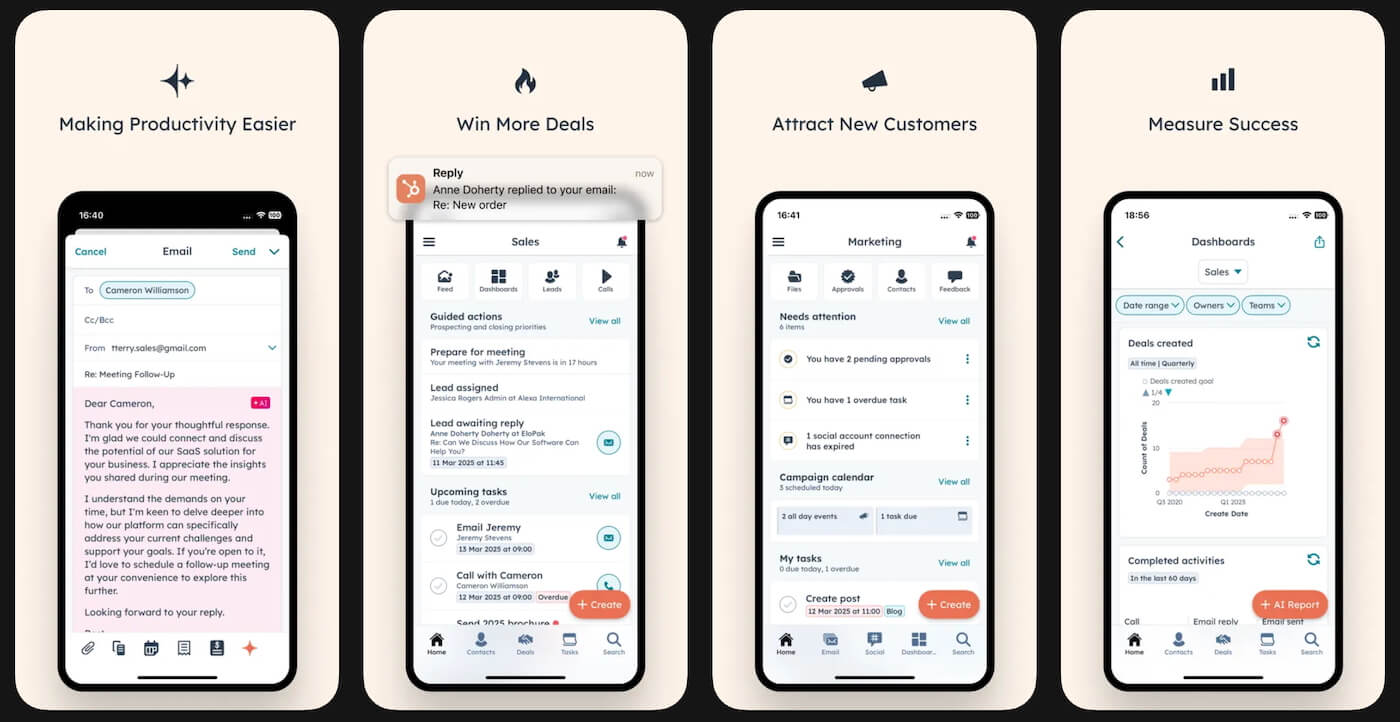
HubSpot’s mobile app allows users to view contacts, manage deals, log activities, and receive notifications on the go. The interface is clean and supports core CRM functions, which is helpful for field sales teams. While generally well-rated, some users report occasional login or performance issues, particularly on Android.
Score: 4.25 / 5
In this HubSpot CRM review, I gave the platform’s advanced features 4.25 out of 5. HubSpot performs especially well in campaign execution, segmentation, and scoring across sales and marketing. Its main limitation at this level is relationship intelligence and deep account mapping, where it offers solid CRM visibility but not the same depth as enterprise platforms built specifically for complex account structures.
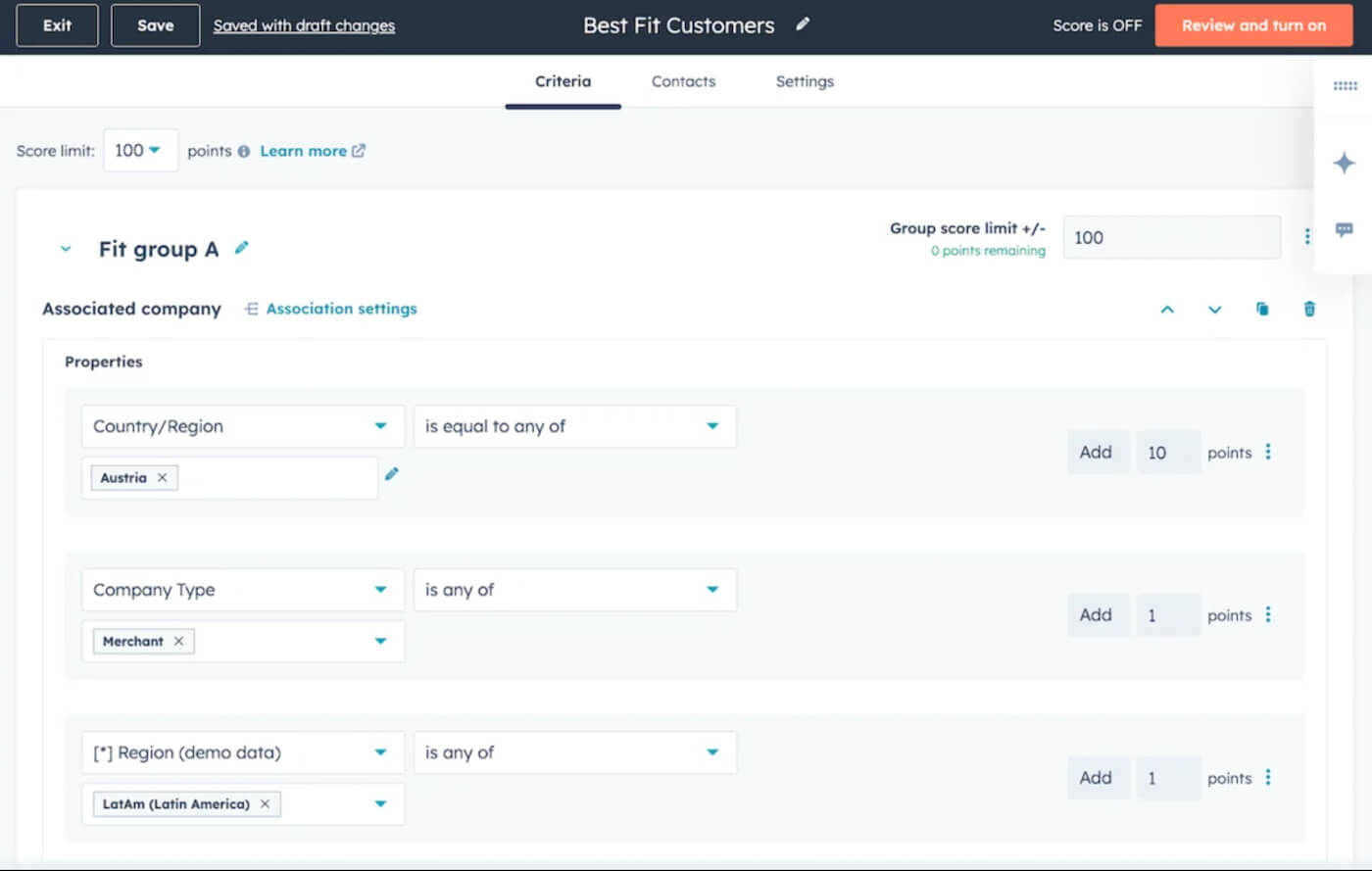
HubSpot supports both rule-based and predictive lead scoring, allowing teams to assign values based on engagement, fit, and behavioral data. Marketing can score leads using website visits, email activity, and form submissions, while sales can prioritize deals based on pipeline signals. Predictive and more advanced scoring models are typically available at higher-tier plans.
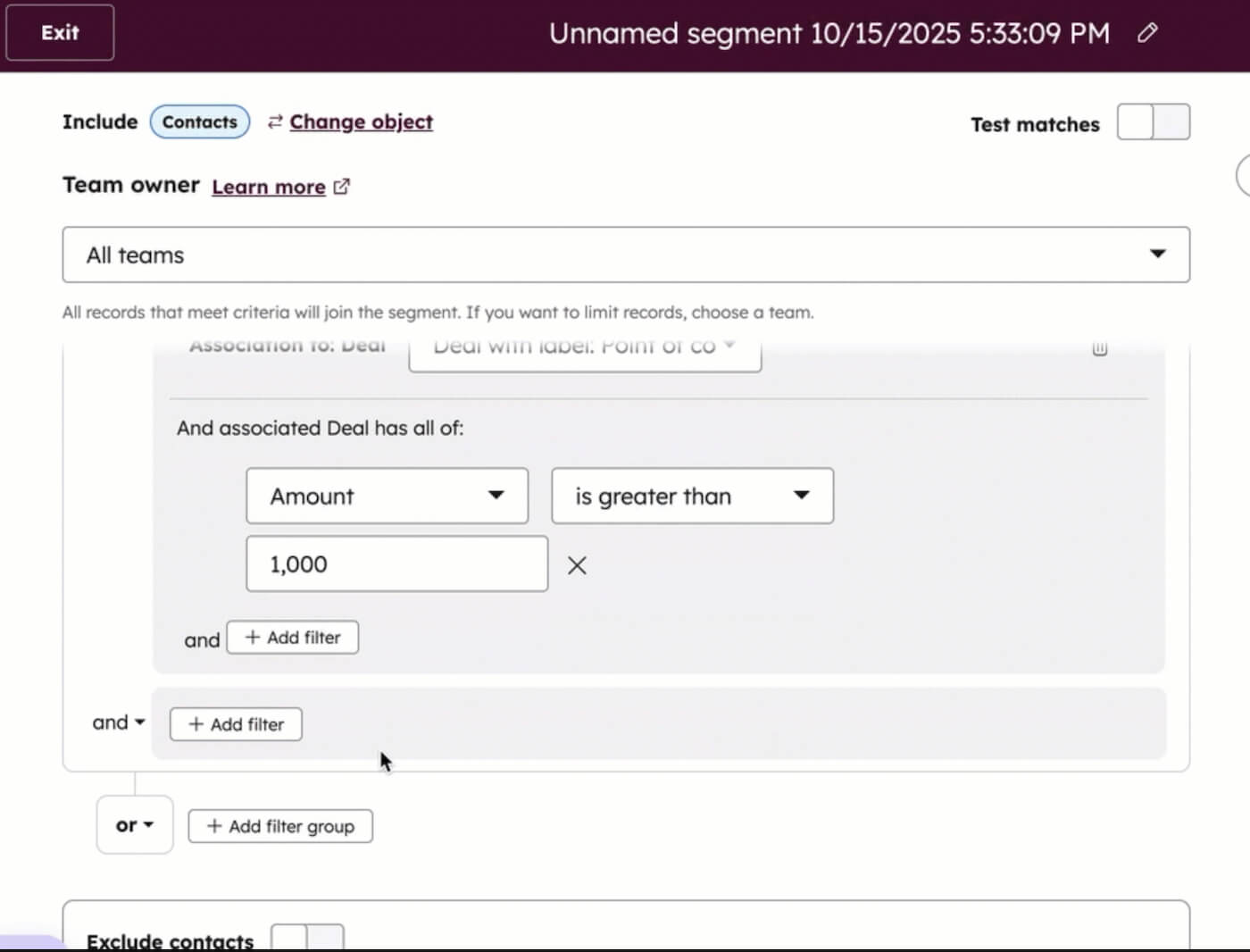
HubSpot offers robust segmentation through active and static lists built from contact properties, engagement history, lifecycle stage, and custom fields. Teams can create highly targeted audiences for campaigns or sales outreach, and lists update dynamically as contacts meet defined criteria. Segmentation is one of HubSpot’s strengths because it pulls from a unified CRM record across hubs.
HubSpot’s scoring, segmentation, and automation tools aren’t just theoretical benefits. In its ROI report, 76% of sales professionals say HubSpot improved their win rates, suggesting the platform’s visibility and follow-up tools translate into measurable sales impact.
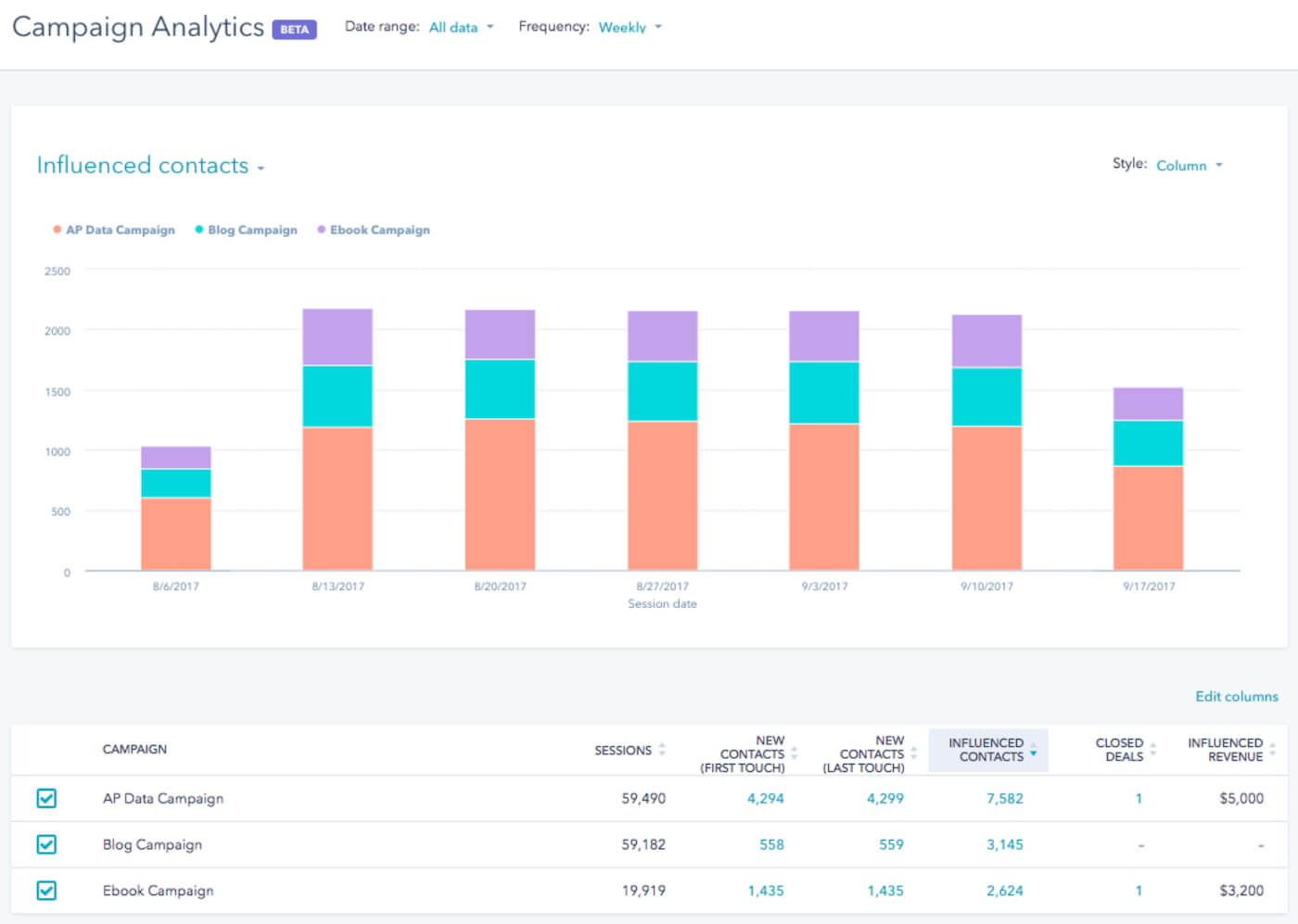
HubSpot excels in campaign execution with built-in tools for email marketing, sales sequences, landing pages, forms, and multi-step automation. Marketing can nurture leads with workflows, while sales can enroll prospects into sequences for structured follow-up. Because everything connects back to the CRM, teams can track campaign influence on pipeline and revenue within the same system.
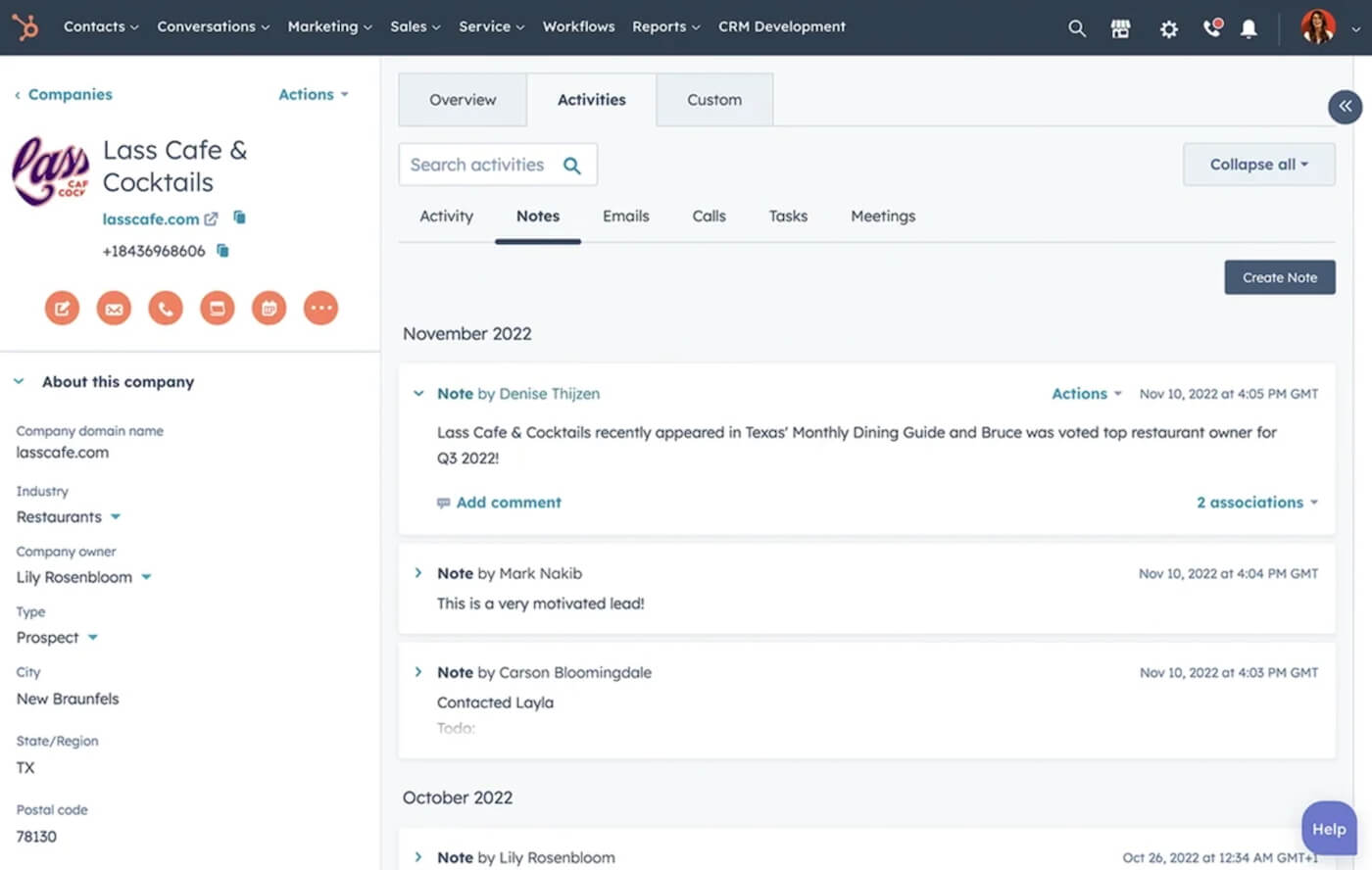
HubSpot provides visibility into company records, associated contacts, deal history, and activity timelines, which support basic account-level insights. However, it does not offer advanced org-chart mapping, formal buying committee visualization, or deep relationship scoring found in some enterprise CRMs. For teams with highly complex multi-account structures or strategic account mapping needs, this is where HubSpot shows its limits.
HubSpot CRM customer service
Score: 4.25 / 5
HubSpot’s customer service is solid, but access depends on your subscription. All customers can use the Help Center (Knowledge Base) and the HubSpot Community, while direct support expands by tier. HubSpot also states that if you have multiple HubSpot products, your support options are based on your highest subscription, and view-only seats don’t get email/chat/phone support.
| Free | Starter | Professional | Enterprise | |
| Knowledge base | ✓ | ✓ | ✓ | ✓ |
| Community | ✓ | ✓ | ✓ | ✓ |
| Chat support | X | ✓ | ✓ | ✓ |
| Email support | X | ✓ | ✓ | ✓ |
| Phone support | X | X | ✓ | ✓ |
For availability, HubSpot publishes that its support organization operates 24/7 globally, with coverage structured by region and with published observed holidays. On top of live support, HubSpot’s self-serve enablement is a differentiator: HubSpot Academy offers free courses and certifications that help teams onboard and upskill without opening tickets.
Score: 4.25 / 5
HubSpot CRM scores 4.25 out of 5 for ease of use thanks to its clean interface, logical navigation, and short click paths for common tasks like updating deals, logging activities, and enrolling contacts in sequences. Records surface key information, including contact history, pipeline stage, and tasks, in one view, and the mobile app supports core CRM functions for reps working in the field.
Onboarding and setup are straightforward, with guided checklists, intuitive terminology, and training through HubSpot Academy. Teams can import data, customize pipelines, and launch basic automation quickly, while admins can manage fields, users, permissions, and workflows without heavy technical work, though larger teams may still need a dedicated ops resource as complexity grows.
Ease of adoption is one of HubSpot’s strengths, and that aligns with the company’s survey data showing 79% of users say HubSpot is easy to use. This supports its strong ease-of-use score and explains why teams often get productive quickly.
HubSpot CRM is a clear industry leader, but it isn’t the best match for every team. If you need deeper customization, more advanced reporting and analytics, or a lower-cost path to premium features, it’s worth comparing a few strong competitors. Below are three CRM platforms I consider the best HubSpot CRM alternatives, based on flexibility, insight depth, and overall value.
| Software |  |  |  |
| Best for | SMBs that want low-cost customization and flexible workflows. | Sales teams that need simple pipeline management and fast adoption | Mid-market and enterprise teams that need deep customization and complex reporting |
| Key features |
|
|
|
| Starting price* | Free or $14/user/month | $14/user/month | Free or $25/user/month |
| Learn more | Read our expert Zoho CRM review or Visit Zoho CRM | Read our expert Pipedrive review or Visit Pipedrive | Read our expert Salesforce review or Visit Salesforce |
*All per-user prices are with a one-year commitment unless otherwise noted.
For this HubSpot CRM review, I scored the platform using a structured rubric covering pricing, general and advanced features, ease of use, support, and overall value. My assessment combines hands-on testing with verified user feedback to measure how well HubSpot supports real sales and marketing alignment.
I evaluated scalability, transparency, and total cost as teams add seats, hubs, and advanced features. I gave additional weight to the free CRM and how much functionality remains accessible before upgrading.
I assessed core CRM capabilities, including contact and deal management, reporting dashboards, pipeline customization, automation, communication tools, integrations, and mobile usability. These determine how effectively sales and marketing operate in one system.
In this review of HubSpot CRM, I evaluated lead and deal scoring, segmentation, campaign tools, and account visibility. I focused on how well HubSpot CRM connects marketing engagement to pipeline through automation and reporting.
I examined UI clarity, navigation efficiency, onboarding, setup time, and ongoing admin management. I also considered how easily teams can scale workflows without heavy technical overhead.
I evaluated support channels by tier, service availability, and the strength of self-serve resources such as the Help Center and HubSpot Academy.
I combined my testing with third-party reviews to assess real-world usability, alignment impact, and whether HubSpot’s pricing matches its feature depth.
HubSpot CRM is the shared customer database, Sales Hub adds sales execution tools, and the Customer Platform connects Sales, Marketing, Service, CMS, and Ops on one data layer for cross-team visibility.
Yes, because both teams share lifecycle stages, contact timelines, and reporting, so that marketing can track pipeline impact and sales can understand lead context before outreach.
They work from the same records, so engagement history, segmentation, deal updates, and customer details stay consistent across teams without manual syncing.
Yes, sales can view pages visited, forms submitted, email interactions, and campaign activity on the contact record to personalize follow-up and prioritize outreach.
Yes, HubSpot can score leads and automate assignment, notifications, stage changes, and follow-up workflows so handoffs happen faster and with fewer gaps.
Costs can rise quickly as you add hubs, seats, higher tiers, and advanced customization, reporting, and automation features, which are gated to premium plans, making scaling teams or complex processes more expensive than expected.
HubSpot links marketing activity to pipeline and revenue with attribution and funnel reporting while tracking conversion and lifecycle progression to spot where lead quality or handoffs break down
HubSpot CRM’s shared contact database, lifecycle stages, automation, and revenue reporting make it easy to connect marketing engagement to pipeline and give sales the right context for follow-up. The downside is that costs can rise as you add hubs, seats, and advanced features, and deeper customization often requires higher tiers. If you want a usable platform that supports real sales and marketing alignment, HubSpot is a strong pick. Use this HubSpot CRM review as a basis for deciding whether HubSpot can align your sales and marketing teams on one system.

Selling Signals delivers actionable advice for sales and marketing professionals. Learn strategies that help you hit targets, strengthen customer relationships, and win more business. Get expert advice on lead generation, sales processes, CRM software, sales management, and account management directly to your inbox.
Property of TechnologyAdvice. © 2026 TechnologyAdvice. All Rights Reserved
Advertiser Disclosure: Some of the products that appear on this site are from companies from which TechnologyAdvice receives compensation. This compensation may impact how and where products appear on this site including, for example, the order in which they appear. TechnologyAdvice does not include all companies or all types of products available in the marketplace.